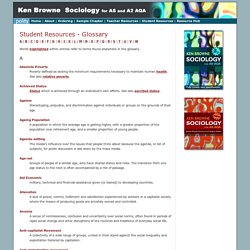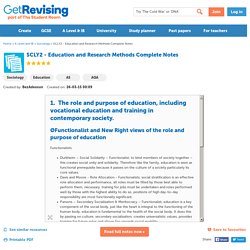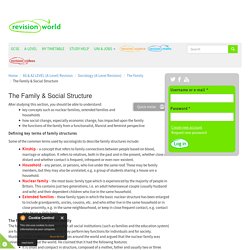

Sociology Education Revision Guide. Sociology Family Revison Guide. Sociology for AS and A2 AQA. Words highlighted within entries refer to terms found elsewhere in the glossary.

Absolute Poverty Poverty defined as lacking the minimum requirements necessary to maintain human health. See also relative poverty. Achieved Status Status which is achieved through an individual’s own efforts. Ageism Stereotyping, prejudice, and discrimination against individuals or groups on the grounds of their age. Ageing Population A population in which the average age is getting higher, with a greater proportion of the population over retirement age, and a smaller proportion of young people.
Agenda-setting The media’s influence over the issues that people think about because the agenda, or list of subjects, for public discussion is laid down by the mass media. Age-set Groups of people of a similar age, who have shared status and roles. Aid Economic military, technical and financial assistance given (or loaned) to developing countries. Alienation Anomie Anti-capitalist Movement Anti-globalization movement Apartheid Bias. Sociology top 10 tips. SCLY2 - Education and Research Methods Complete Notes - Revision Notes in A Level and IB Sociology.
Functionalists.

Durkheim – Social Solidarity – Functionalist; to bind members of society together – this creates social unity and solidarity. Therefore like the family, education is seen as functional prerequisite because it passes on the culture of a society particularly its core values.Davis and Moore - Role Allocation - Functionalists; social stratification is an effective role allocation and performance, all roles must be filled by those best able to perform them, necessary training for jobs must be undertaken and roles performed well by those with the highest ability to do so, positions of high day-to-day responsibility are most functionally significant.Parsons – Secondary Socialisation & Meritocracy – Functionalist; education is a key component of the social body, just like the heart is integral to the functioning of the human body, education is fundamental to the health of the social body.
Evaluation. There is evidence to show equal opportunity is non-existent in education. Sociology Education Key Words - Flashcards in A Level and IB Sociology. Log in to Get Revising. Education and Research Methods Quiz Cards - Flashcards in A Level and IB Sociology. AQA AS Sociology Education Summary - Revision Notes in A Level and IB Sociology. A-Level Sociology. Join over 1.2 million students every month Accelerate your learning by 29% Unlimited access from just £6.99 per month Get help from 80+ teachers and hundreds of thousands of student written documents Marked by Teachers essays 26 Peer Reviewed essays 6 Sociology is the study of people in society; how societies affect the people within them and how people affect their society.

It is a wide-ranging subject and investigates how factors such as family, class, ethnicity and the mass media affect the behaviour of individuals and groups. You will study some of the classic models and theoretical perspectives and investigate how modern societies either conform or contradict those theories. Sociology requires strong powers of observation, analysis and essay writing and Marked by Teachers has significant numbers of essay examples which will enable you to develop and strengthen those skills required by Sociology examiners. Marked by a teacher This document has been marked by one of our great teachers. A Level and IB Sociology - 8,437 A Level and IB Sociology resources. Research Methods. The Family. The Family & Social Structure. After studying this section, you should be able to understand: key concepts such as nuclear families, extended families and households how social change, especially economic change, has impacted upon the family the functions of the family from a functionalist, Marxist and feminist perspective Defining key terms of family structures Some of the common terms used by sociologists to describe family structures include: Kinship – a concept that refers to family connections between people based on blood, marriage or adoption.

It refers to relatives, both in the past and in the present, whether close or distant and whether contact is frequent, infrequent or even non–existent. The functionalist view of the family The functionalist approach argues that all social institutions (such as families and the education system) are functional or beneficial because they perform key functions for individuals and for society. The influence of these traditional beliefs about family life has been immense. Sociology_A_guide. Sociology_A-level_QA.